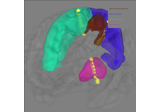mne.stc_near_sensors#
- mne.stc_near_sensors(evoked, trans, subject, distance=0.01, mode='sum', project=True, subjects_dir=None, src=None, picks=None, surface='pial', verbose=None)[source]#
Create a STC from ECoG, sEEG and DBS sensor data.
- Parameters
- evokedinstance of
Evoked The evoked data. Must contain ECoG, sEEG or DBS channels.
- transpath-like |
dict| instance ofTransform|None If str, the path to the head<->MRI transform
*-trans.fiffile produced during coregistration. Can also be'fsaverage'to use the built-in fsaverage transformation. If trans is None, an identity matrix is assumed.Changed in version 0.19: Support for ‘fsaverage’ argument.
- subject
str The subject name.
- distance
float Distance (m) defining the activation “ball” of the sensor.
- mode
str Can be
"sum"to do a linear sum of weights,"weighted"to make this a weighted sum,"nearest"to use only the weight of the nearest sensor, or"single"to do a distance-weight of the nearest sensor. Default is"sum". See Notes.Changed in version 0.24: Added “weighted” option.
- project
bool If True, project the sensors to the nearest
'pialsurface vertex before computing distances. Only used when doing a surface projection.- subjects_dirpath-like |
None The path to the directory containing the FreeSurfer subjects reconstructions. If
None, defaults to theSUBJECTS_DIRenvironment variable.- srcinstance of
SourceSpaces The source space.
Warning
If a surface source space is used, make sure that
surface='pial'was used during construction, or that you setsurface='pial'here.- picks
str| array_like |slice|None Channels to include. Slices and lists of integers will be interpreted as channel indices. In lists, channel type strings (e.g.,
['meg', 'eeg']) will pick channels of those types, channel name strings (e.g.,['MEG0111', 'MEG2623']will pick the given channels. Can also be the string values “all” to pick all channels, or “data” to pick data channels. None (default) will pick good sEEG, ECoG, and DBS channels.New in v0.24.
- surface
str|None The surface to use if
src=None. Default is the pial surface. If None, the source space surface will be used.New in v0.24.1.
- verbose
bool|str|int|None Control verbosity of the logging output. If
None, use the default verbosity level. See the logging documentation andmne.verbose()for details. Should only be passed as a keyword argument.
- evokedinstance of
- Returns
- stcinstance of
SourceEstimate The surface source estimate. If src is None, a surface source estimate will be produced, and the number of vertices will equal the number of pial-surface vertices that were close enough to the sensors to take on a non-zero volue. If src is not None, a surface, volume, or mixed source estimate will be produced (depending on the kind of source space passed) and the vertices will match those of src (i.e., there may be me many all-zero values in stc.data).
- stcinstance of
Notes
For surface projections, this function projects the ECoG sensors to the pial surface (if
project), then the activation at each pial surface vertex is given by the mode:'sum'Activation is the sum across each sensor weighted by the fractional
distancefrom each sensor. A sensor with zero distance gets weight 1 and a sensor atdistancemeters away (or larger) gets weight 0. Ifdistanceis less than half the distance between any two sensors, this will be the same as'single'.
'single'Same as
'sum'except that only the nearest sensor is used, rather than summing across sensors within thedistanceradius. As'nearest'for vertices with distance zero to the projected sensor.
'nearest'The value is given by the value of the nearest sensor, up to a
distance(beyond which it is zero).
'weighted'The value is given by the same as
sumbut the total weight for each vertex is 1. (i.e., it’s a weighted sum based on proximity).
If creating a Volume STC,
srcmust be passed in, and this function will project sEEG and DBS sensors to nearby surrounding vertices. Then the activation at each volume vertex is given by the mode in the same way as ECoG surface projections.New in v0.22.

